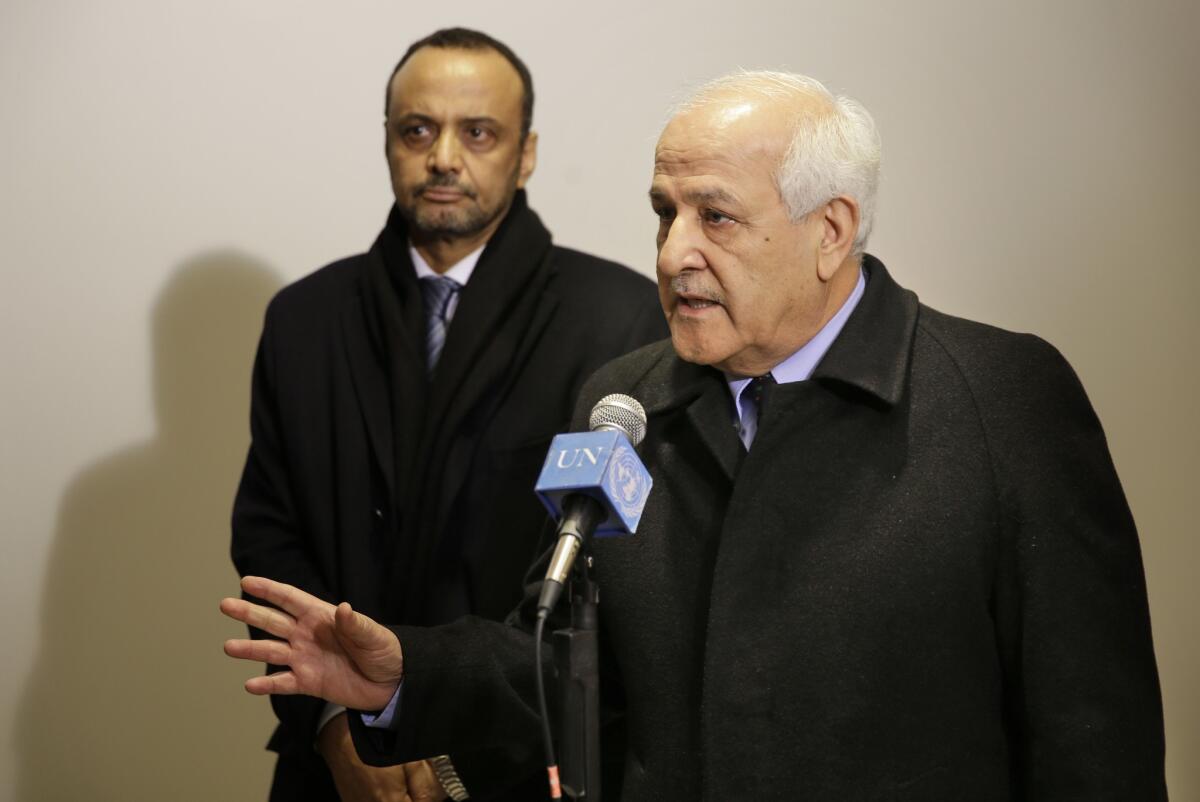Security Council rejects Palestinian demand to withdraw Israeli forces

- Share via
Reporting from Washington — The United Nations Security Council on Tuesday rejected a proposal demanding withdrawal of Israeli forces from the West Bank and East Jerusalem by the end of 2017, in another setback for Palestinian efforts to build international pressure on Israel.
The proposed resolution, which needed nine votes from the 15-member council to succeed, got eight votes in support, with two against and five abstentions.
This meant that the United States, which joined Australia in voting against the proposal, was not required to cast a veto to block it. U.S. officials have been eager to avoid that move, which would have put them at odds with Arab states on the vote. The U.S. needs their support on several key issues, including the battle against the Islamic State militant group in Iraq and Syria.
Palestinian Authority President Mahmoud Abbas hoped this appeal to the council could give new momentum to his stalled drive for an independent state and bolster his domestic support. The proposal also called for long-stalled peace negotiations to be concluded within 12 months. It called for an end to Jewish settlement activity and for designation of East Jerusalem as the capital of the new Palestinian state.
While Abbas won support from the Arab bloc, critics said that the proposal’s language was too hard-line and that advocates had failed to take enough time to work out a compromise that could have yielded nine votes. Israel strongly opposed the measure as an attempt to circumvent peace negotiations.
Samantha Power, the U.S. ambassador to the United Nations, said the proposal was “deeply imbalanced,” without enough consideration of Israel’s security needs.
The proposal would “undermine efforts to get back to an atmosphere that makes it possible to achieve two states for two peoples,” she said after the vote.
U.S. officials, who have been hoping to restart peace talks, have pushed the Palestinians to delay any such consideration until after Israel’s March elections.
France’s yes vote was a small victory for the Palestinians. Divisions among the Western powers offer the Palestinians more leverage in making their case.
Francois Delattre, the French ambassador to the United Nations, said his nation voted in favor of the resolution because the council has an “urgent need to act” to move the standoff toward resolution.
Also voting for the resolution were Russia, China, Jordan, Chad, Luxembourg, Argentina and Chile. Britain, Rwanda, Lithuania, Nigeria and South Korea abstained.
The Palestinian bid has been clearly a long shot for months, raising questions about Abbas’ real goal in the diplomatic effort.
Ilan Goldenberg, a former top administration advisor on the Middle East, speculated that Abbas might have wanted to show Palestinians that he continued to do all he could in pursuit of the national interest, despite the long odds. Alternatively, Abbas might have been making the move as a prelude to “a far more inflammatory step,” such as a bid for Palestinian membership in the International Criminal Court, Goldenberg said.
Israeli officials fear Abbas might seek court membership to enable international prosecution of Israelis.
“What matters is what happens now,” said Goldenberg, who is with the Center for a New American Security think tank in Washington. “What is he planning to do next?”
Some diplomats speculated that Abbas might be aiming to win only limited backing in the council, because that would avoid forcing a U.S. veto and souring relations with one of the Palestinians’ most important supporters.
paul.richter@latimes.com
More to Read
Sign up for Essential California
The most important California stories and recommendations in your inbox every morning.
You may occasionally receive promotional content from the Los Angeles Times.














